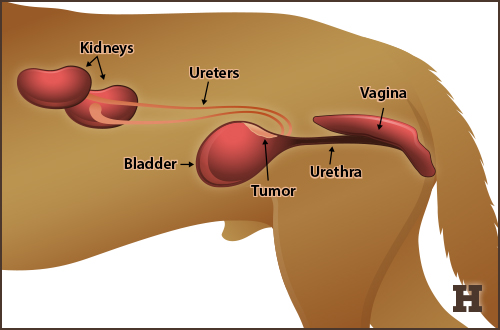Understanding and Successfully Treating Pancreatic Cancer in Dogs
The canine’s pancreas is essentially a gland that produces the enzymes needed to break down specific foods. Canines naturally produce a low amount of enzymes due to the fact that their natural ,evolutionary diet did not require a high amount.
The pancreas also produces hormones such as insulin which is the main hormone regulating sugar levels in the blood as well as gastrin, which stimulates the production of acid in the stomach and intestines.
 A canine’s pancreas does not produce certain types of enzymes such as Amylase, which is needed to breakdown grains often found in commercially manufactured foods.
A canine’s pancreas does not produce certain types of enzymes such as Amylase, which is needed to breakdown grains often found in commercially manufactured foods.
The Three Types of Pancreatic Cancer Found in Dogs:
Pancreatic Nodular Hyperplasia
Pancreatic nodular hyperplasia – fairly common finding in older dogs and sometimes follows injury but is usually without any known cause. We do not know the specific causes of the cancers.
Exocrine Cancer (Uncommon)
Most often these are malignant tumors though rarely benign tumors are found.than their malignant counterparts. Found more in older dogs, however they are found in dogs as well as three.
Endocrine Cancer (Uncommon)
Usually derived from the insulin secreting ‘beta cells’, and is called an insulinoma.
In recent times, dogs have been introduced to a  processed diet often containing grains. As a result, pancreatic conditions such as pancreatitis, pancreatic cancer, canine diabetes and stomach cancer in dogs have all been on the rise.
processed diet often containing grains. As a result, pancreatic conditions such as pancreatitis, pancreatic cancer, canine diabetes and stomach cancer in dogs have all been on the rise.
Main Causes for Pancreatic Cancer in Dogs
The causes for canine pancreatic cancer are not well understood. There’s been a dramatic rise in many types of canine cancer in recent years, especially in the organs of the digestive tract, and certain foods and diets are considered to be a major contributor.
When foods or ingredients that are unnatural to a dogs physiology are introduced, their pancreas is unable to secrete the proper enzymes. As a result, the chemistry in the canines digestive tract is severely off, thus prohibiting it to function properly. This intensely challenges the pancreas as well as the immune system as a whole, causing a number of health complications and opening the door to disease.
It’s unfortunate, but many dog owners ( including myself at one point) unknowingly feed their dog a foods that actually causes these complications.
It’s only in recent times that dogs have been introduced to a processed diet and as a result, pancreatic conditions such as pancreatitis, pancreatic cancer, canine diabetes and stomach cancer in dogs have all been on the rise.
The pancreas of canines cannot produce the enzymes needed to properly break down grains.They do produce enzymes such as Protease to break down and digest protein, and Lipase to break down and digest fat, and they actually produce even low levels of these enzymes. That’s because they were’ designed to get some of the enzymes from consuming the gusts/end trails of their prey, such as Cellulase which helps break down vegetable fiber .
Dogs derived from wolves and their physiology is close 99% the same. If we look at wolves or canines in the wild, we can see that they’re carnivores and don’t graze any grains. Further more, even the main prey they eat such as rabbits and deer, don’t consume grains either nor do they produce/contain the enzymes to properly break down grains.
Canine Pancreatic Cancer Symptoms
Symptoms for Pancreatic Cancer in Dogs often aren’t apparent until advanced stages. Physical collapse, loss of consciousness seizures, and extreme weakness are common but because the insulin is released periodically, symptoms are not consistent.
- Fever
- Weakness
- Jaundice
- Poor digestion
- Weight loss
- Abdominal pain

Types of Enzymes
- Protease – breaks down and digest protein
- Amylase – breaks down and digest carbohydrates and starches
- Lipase – breaks down and digest fat
- Cellulase – breaks down fiber
Collapsed or Seizures
If your dog has collapsed or is suffering from seizures because of an insulinoma, medical emergency treatment usually will consist of immediate administration of glucose. For home treatment of sudden collapses or seizures, corn syrup can be given as a temporary solution to increase glucose levels. But medical attention will still be needed.
Conventional Treatments for Canine Pancreatic Cancer
Pancreatic cancer in dogs tends to spread very quickly and often reaches advanced stages before symptoms appear. This makes it extremely diffucult to treat and the prognosis is often poor.
Surgery is the common protocol, however it’s common that other organs are affected by the time of the diagnosis. It’s also extremely difficult to remove all the cancerous tissue and tumor often grow back.
- If there is inflammation of the pancreas or adjacent bile ducts of the liver, antibiotics or anti-inflammatory drugs may be helpful.
- There is no satisfactory treatment to treat cancer of the exocrine pancreas. Diagnosis is usually too late for successful surgery and chemotherapy is usually contra-indicated because the cancers are too painful.
- Benign endocrine cancers can be removed surgically but multiple or malignant ones are not surgically treatable.
- Medical drugs to control blood sugar are often prescribed.
- Prednisolone is a steroid that stimulates formation of glucose and is often a cornerstone of medical treatment.
I am text block. Click edit button to change this text. Lorem ipsum dolor sit amet, consectetur adipiscing elit. Ut elit tellus, luctus nec ullamcorper mattis, pulvinar dapibus leo.
Holistic Treatments for Canine Pancreatic Cancer
Conventional approaches often fail because they generally focus only on the tumor itself and fail to address the underlying problem. That being said, with pancreatic cancer in dogs, even using holistic dietary treatments in conjunction with conventional treatments still has a poor prognosis.
Whether surgery has been performed or not, to be successful, the diet has to be on point, in that it easy on pancreatic functions while boosting vitality and not enabling cancer cells.
Reducing the meal sizes and increasing the frequency will help to limit the fluctuations in insulin that instigate the hypoglycemic episodes. There are also plenty of supplements and herbs such as Milk Thistle that can remove toxins and help with number of pancreatic conditions including canine pancreatitis (swelling of the pancreas) cancer.
If remission is to be achieved and maintained, the digestive tract needs to function properly in order to boost the immune system and hopfully enable the healing process.
Is it a Case of Faulty Genes?
In the vast majority of cases, absolutely not. Some types of cancer are more common it certain breeds, as they may be more predisposed. However, it’s important to understand that predisposed does not mean predetermined! Genetics are a factor, but there are many other factors as well.
For cancer, or any disease to develop, a dysfunction in the immune system must be present. So by addressing this area, we can greatly reduce illness regardless of what genetic challenges a certain breed has.
All that being said, when a breed is more predisposed, this simply means that when something is challenging the immune system, this is the weakest link and often the first place that we see the effects.
Many dogs have these same “weak links” and go on to live a healthy full lives, while some unfortunately do not. Genes are merely blueprints, and it’s how well these these blueprints are properly built upon and maintained that makes the difference.
External factors such as dietary complications and toxins are a main factor in affecting the digestive tract and immune system, which are directly linked. This intern, allows for the cells to be altered and cancer to develop.



